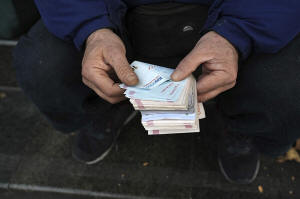Iran's currency falls to record low against the dollar as tensions run
high
[April 05, 2025] By
NASSER KARIMI and JON GAMBRELL
TEHRAN, Iran (AP) — Iran ’s rial currency traded Saturday at a record
low against the U.S. dollar as the country returned to work after a long
holiday, costing over 1 million rials for a single greenback as tensions
between Tehran and Washington likely will push it even lower.
The exchange rate had plunged to over 1 million rials during the Persian
New Year, Nowruz, as currency shops closed and only informal trading
took place on the streets, creating additional pressure on the market.
But as traders resumed work Saturday, the rate fell even further to
1,043,000 to the dollar, signaling the new low appeared here to stay.
On Ferdowsi Street in Iran’s capital, Tehran, the heart of the country’s
money exchanges, some traders even switched off their electronic signs
showing the going rate as uncertainty loomed over how much further the
rial could drop.
“We turn it off since we are not sure about the successive changes of
the rate,” said Reza Sharifi, who works at one exchange.
Tensions with US squeeze the rial
Iran’s economy has been severely affected by international sanctions,
particularly after U.S. President Donald Trump unilaterally withdrew
America from Tehran’s nuclear deal with world powers in 2018. At the
time of the 2015 deal, which saw Iran drastically limit its enrichment
and stockpiling of uranium in exchange for lifting of international
sanctions, the rial traded at 32,000 to the dollar.

After Trump returned to the White House for his second term in January,
he restarted his so-called “maximum pressure” campaign targeting Tehran
with sanctions. He again went after firms trading Iranian crude oil,
including those selling at a discount in China.
Trump meanwhile has written to Iran’s Supreme Leader Ayatollah Ali
Khamenei, trying to jumpstart direct talks between Tehran and
Washington. So far, Iran has maintained it is willing for indirect
talks, but such discussions under the Biden administration failed to
make headway.
Meanwhile, Trump is continuing an intense airstrike campaign targeting
the Iranian-backed Houthi rebels in Yemen, the last force in Tehran’s
self-described “Axis of Resistance” able to attack Israel after other
militant groups were mauled by Israel during its war on Hamas in the
Gaza Strip.

[to top of second column] |

A street money exchanger poses for a photo without showing his face
as he counts Iranian banknotes at a commercial district in downtown
Tehran, Iran, Dec. 23, 2022. (AP Photo/Vahid Salemi, File)
 Mehdi Darabi, a market analyst, said
he believed that foreign pressures in recent months caused
“expectations for the possibility of a decrease in oil sales and
more inflation, and it caused a higher rate for hard currencies,”
according to Tehran’s Donay-e-Eqtesad economic newspaper.
Economic pressure inflames Iranian public and politics
Economic upheavals have evaporated the public’s savings, pushing
average Iranians into holding onto hard currencies, gold, cars and
other tangible wealth. Others pursue cryptocurrencies or fall into
get-rich-quick schemes.
Meanwhile, internal political pressure remains inflamed still over
the mandatory hijab, or headscarf, with women still ignoring the law
on the streets of Tehran. Rumors also persist over the government
potentially increasing the cost of subsidized gasoline in the
country, which has sparked nationwide protests in the past.
The falling rial has put more pressure as well on Iranian reformist
President Masoud Pezeshkian. In March, when the rate was 930,000
rials to the dollar, Iran’s parliament impeached his finance
minister, Abdolnasser Hemmati over the crashing rial and accusations
of mismanagement.
Anger over government spending also saw Pezeshkian fire his vice
president in charge of parliamentary affairs, Shahram Dabiri, for
taking a luxury cruise to Antarctica, state media reported. Though
Dabiri reportedly used his own money for the trip with his wife, the
Instagram photos posted of his trip angered an Iranian public
scrapping by to survive.
“In a situation where the economic pressures on people are huge and
the number of deprived people is massive, expensive recreational
trip by officials even by their own personal fund is not defendable
and reasonable,” Pezeshkian said in firing Dabiri, who so far hasn’t
offered any public explanation for his trip.
___
Gambrell reported from Dubai, United Arab Emirates.
All contents © copyright 2025 Associated Press. All rights reserved |